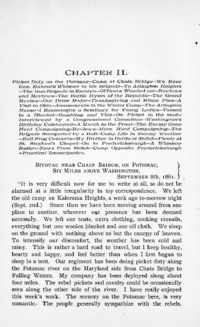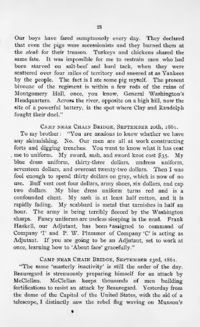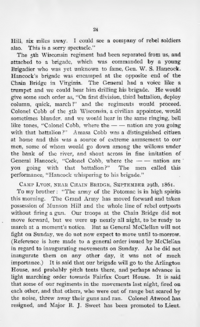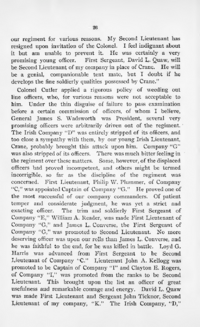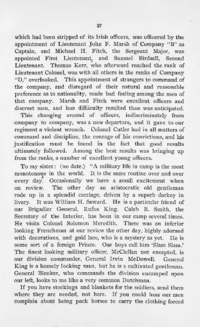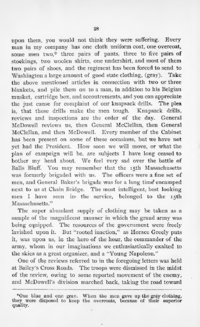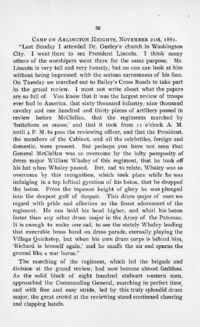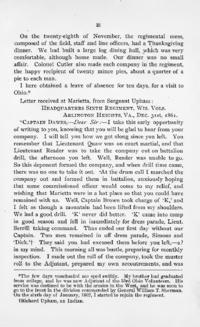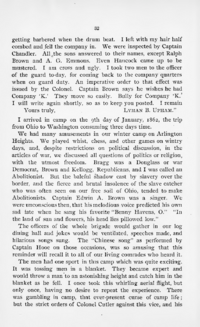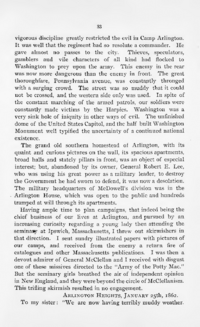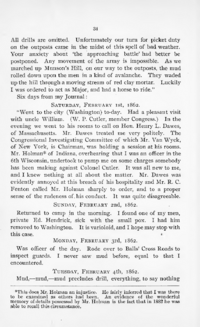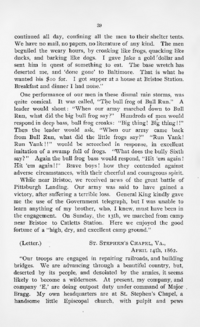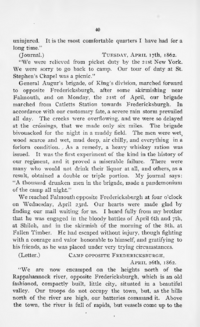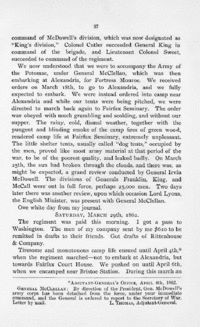Template:SWTSWV (Chapter 2)
| September 8, 1861 - Rufus R. Dawes to ? |
|---|
|
To my brother:
| September 20, 1861 - Rufus R. Dawes to Ephraim C. Dawes (Brother) |
|---|
|
| September 23, 1861 - Rufus R. Dawes to ? |
|---|
|
The 5th Wisconsin regiment had been separated from us, and attached to a brigade, which was commanded by a young Brigadier who was yet unknown to fame, Gen. W S. Hancock. Hancock's brigade was encamped at the opposite end of the Chain Bridge in Virginia. The General had a voice like a trumpet and we could hear him drilling his brigade. He would give some such order as, "On first division, third battalion, deploy column, quick, march!" and the regiments would proceed. Colonel Cobb of the 5th Wisconsin, a civilian appointee, would sometimes blunder, and we would hear in the same ringing, bell like tones, "Colonel Cobb, where the -- nation are you going with that battalion?" Amasa Cobb was a distinguished citizen at home and this was a source of extreme amusement to our men, some of whom would go down among the willows under the bank of the river, and shout across in fine imitation of General Hancock, "Colonel Cobb, where the -- nation are you going with that battalion?" The men called this performance, "Hancock whispering to his brigade."
To my brother:
| September 29, 1861 - Rufus R. Dawes to Ephraim C. Dawes (Brother) |
|---|
|
| October 6, 1861 - Rufus R. Dawes to ? |
|---|
|
To my sister:
| September 29, 1861 - Rufus R. Dawes to Ephraim C. Dawes (Brother) |
|---|
|
Colonel Cutler applied a rigorous policy of weeding out line officers, who, for various reasons were not acceptable to him. Under the thin disguise of failure to pass examination before a certain commission of officers, of whom I believe, General James S. Wadsworth was President, several very promising officers were arbitrarily driven out of the regiment. The Irish Company "D" was entirely stripped of its officers, and too close a sympathy with them, by our young Irish Lieutenant, Crane, probably brought this attack upon him. Company "G" was also stripped of its officers. There was much bitter feeling in the regiment over these matters. Some, however, of the displaced officers had proved incompetent, and others might be termed incorrigible, so far as the discipline of the regiment was concerned. First Lieutenant, Philip W. Plummer, of Company "C," was appointed Captain of Company "G." He proved one of the most successful of our company commanders. Of patient temper and considerate judgment, he was yet a strict and exacting officer. The trim and soldierly First Sergeant of Company "E," William A. Reader, was made First Lieutenant of Company "G," and James L. Converse, the First Sergeant of Company "G," was promoted to Second Lieutenant. No more deserving officer was upon our rolls than James L. Converse, and he was faithful to the end, for he was killed in battle. Loyd G. Harris was advanced from First Sergeant to be Second Lieutenant of Company "C." Lieutenant John A. Kellogg was promoted to be Captain of Company "I" and Clayton E. Rogers, of Company "I," was promoted from the ranks to be Second Lieutenant. This brought upon the list an officer of great usefulness and remarkable courage and energy. David L. Quaw was made First Lieutenant and Sergeant John Ticknor Second Lieutenant of my company, "K." The Irish Company, "D," which had been stripped of its Irish officers, was officered by the appointment of Lieutenant John F. Marsh of Company "B" as Captain, and Michael H. Fitch, the Sergeant Major, was appointed First Lieutenant, and Samuel Birdsall, Second Lieutenant. Thomas Kerr, who afterward reached the rank of Lieutenant Colonel, was with all others in the ranks of Company "D," overlooked. This appointment of strangers to command of the company, and disregard of their natural and reasonable preference as to nationality, made bad feeling among the men of that company. Marsh and Fitch were excellent officers and discreet men, and less difficulty resulted than was anticipated. This changing around of officers, indiscriminately from company to company, was a new departure, and it gave to our regiment a violent wrench. Colonel Cutler had in all matters of command and discipline, the courage of his convictions, and his justification must be found in the fact that good results ultimately followed. Among the best results was bringing up from the ranks, a number of excellent young officers.
To my sister:
| Unknown Date - Rufus R. Dawes to (Sister) |
|---|
|
The super abundant supply of clothing may be taken as a sample of the magnificent manner in which the grand army was being equipped. The resources of the government were freely lavished upon it. But "rooted inaction," as Horace Greely puts it, was upon us, in the hero of the hour, the commander of the army, whom in our imaginations we enthusiastically exalted to the skies as a great organizer, and a "Young Napoleon."
One of the reviews referred to in the foregoing letters was held at Bailey's Cross Roads. The troops were dismissed in the midst of the review, owing to some reported movement of the enemy, and McDowell's division marched back, taking the road toward Washington, to our camp on Arlington Heights. With our column rode a lady visitor; my authority is her own account. Our regiment marched at the head of the column, because we stood on the extreme right of the line. As we marched, the "evening dews and damps" gathered, and our leading singer, Sergeant John Ticknor, as he was wont to do on such occasions, led out with his strong, clear and beautiful tenor voice, "Hang Jeff. Davis on a sour apple tree." The whole regiment joined the grand chorus, "Glory, glory hallelujah, as we go marching on." We often sang this, the John Brown song. To our visitor appeared the "Glory of the coming of the Lord," in our "burnished rows of steel" and in the "hundred circling camps" on Arlington, which were before her.
Julia Ward Howe, our visitor, has said that the singing of the John Brown song by the soldiers on that march, and the scenes of that day and evening inspired her to the composition of the Battle Hymn of the Republic[5] We at least helped to swell the chorus.
| November 21, 1861 - Rufus R. Dawes to ? |
|---|
|
The marching of the regiment, which led the brigade and division at the grand review, had now become almost faultless. As the solid block of eight hundred stalwart western men, approached the Commanding General, marching in perfect time, and with free and easy stride, led by this truly splendid drum major, the great crowd at the reviewing stand continued cheering and clapping hands.
On the twenty-eighth of November, the regimental mess, composed of the field, staff and line officers, had a Thanksgiving dinner. We had built a large log dining hall, which was very comfortable, although home made. Our dinner was no small affair. Colonel Cutler also made each company in the regiment, the happy recipient of twenty mince pies, about a quarter of a pie to each man.
I here obtained a leave of absence for ten days, for a visit to Ohio[6]
Letter received at Marietta, from Sergeant Upham:
| December 31, 1861 - Lyman B. Upham to Rufus R. Dawes |
|---|
|
I arrived in camp on the 9th day of January, 1862, the trip from Ohio to Washington consuming three days time.
We had many amusements in our winter camp on Arlington Heights. We played whist, chess, and other games on wintry days, and, despite restrictions on political discussion, in the articles of war, we discussed all questions of politics or religion, with the utmost freedom. Bragg was a Douglass or war Democrat, Brown and Kellogg, Republicans, and I was called an Abolitionist. But the baleful, shadow cast by slavery over the border, and the fierce and brutal insolence of the slave catcher who was often seen on our free soil of Ohio, tended to make Abolitionists. Captain Edwin A. Brown was a singer. We were unconscious then, that his melodious voice predicted his own sad fate when he sang his favorite "Benny Havens, O." "In the land of sun and flowers, his head lies pillowed low."
The officers of the whole brigade would gather in our log dining hall and jokes would be ventilated, speeches made, and hilarious songs sung. The "Chinese song" as performed by Captain Hooe on those occasions, was so amusing that this reminder will recall it to all of our living comrades who heard it.
The men had one sport in this camp which was quite exciting. It was tossing men in a blanket. They became expert and would throw a man to an astonishing height and catch him in the blanket as he fell. I once took this whirling aerial flight, but only once, having no desire to repeat the experience. There was gambling in camp, that ever-present curse of camp life; but the strict orders of Colonel Cutler against this vice, and his vigorous discipline greatly restricted the evil in Camp Arlington. It was well that the regiment had so resolute a commander. He gave almost no passes to the city. Thieves, speculators, gamblers and vile characters of all kind had flocked to Washington to prey upon the army. This enemy in the rear was now more dangerous than the enemy in front. The great thoroughfare, Pennsylvania avenue, was constantly thronged with a surging crowd. The street was so muddy that it could not be crossed, and the western side only was used. In spite of the constant marching of the armed patrols, our soldiers were constantly made victims by the Harpies. Washington was a very sink hole of iniquity in other ways of evil. The unfinished dome of the United States Capitol, and the half built Washington Monument well typified the uncertainty of a continued national existence.
The grand old southern homestead of Arlington, with its quaint and curious pictures on the wall, its spacious apartments, broad halls and stately pillars in front, was an object of especial interest; but, abandoned by its owner, General Robert E. Lee, who was using his great power as a military leader, to destroy the Government he had sworn to defend, it was now a desolation. The military headquarters of McDowell's division was in the Arlington House, which was open to the public and hundreds tramped at will through its apartments.
Having ample time to plan campaigns, that indeed being the chief business of our lives at Arlington, and pursued by an increasing curiosity regarding a young lady then attending the seminary at Ipswich, Massachusetts, I threw out skirmishers in that direction. I sent sundry illustrated papers with pictures of our camps, and received from the enemy a return fire of catalogues and other Massachusetts publications. I was then a devout admirer of General McClellan and I received with disgust one of these missives directed to the "Army of the Potty Mac." But the seminary girls breathed the air of independent opinion in New England, and they were beyond the circle of McClellanism. This trifling skirmish resulted in no engagement.
To my sister:
| January 25, 1862 - Lyman B. Upham to Rufus R. Dawes |
|---|
|
Six days from my Journal:
| JOURNAL |
|---|
|
During the continuance of bad weather, target shooting was about the only exercise required, and Colonel Cutler offered small prizes for excellence. Our Belgian muskets had been exchanged for Springfield rifles, a much lighter and better gun, and this gave great satisfaction. Washington's birthday was celebrated by Congress with appropriate ceremonies. Our brigade formed in a semi-circle in close column before the broad portico of the Arlington House, and listened to the reading of Washington's farewell address, and to an excellent oration from our Brigadier General, Rufus King. The columns were then deployed and battalion volleys of blank cartridges were fired in honor of the day. The inspiration of the occasion was felt more deeply because we stood upon ground once owned by Washington.
On Sunday, the 9th day of March, my uncle, Mr. Cutler, accompanied by Edward Ball, Sergeant at Arms of the House of Representatives, came over to Arlington to visit me in camp. I turned out my company "K" for their inspection. They addressed the men briefly, and assured them that they would soon be called to more active duties, and on that evening we received our marching orders. At 4 o'clock on Monday morning, March 10th, 1862, the old camp on Arlington Heights was broken up. The whole army of the Potomac advanced in full marching order in the direction of Centreville. We expected battle, and our men were in that verdant and idiotic frame of mind, which was then termed "spoiling for a fight." After a hard day's march we encamped two miles west of Fairfax Court House, and on Tuesday morning, March 10th, we were informed that the rebels had evacuated Centreville and Manassas. I quote the comments of my journal, as to the manner in which the announcement of this fact was received. "The men were greatly disappointed. They had made their wills, and written their farewell letters, and wanted to fight a battle. The fortifications at Centreville are by no means so formidable as they have been represented. I saw two saw-logs in the embrasures representing cannons. So much for wooden guns." We remained in camp near Centreville until Saturday, March 15th. At noon on this day the brigade marched back toward Alexandria, and the rain poured down in dismal torrents all the afternoon. We passed an exceedingly disagreeable night in bivouac near Alexandria, and on Sunday morning returned to the old camp on Arlington Heights. General Irvin McDowell had been assigned to the command of an army corps, composed of three divisions. (Franklin, McCall, King.)[11] General Rufus King succeeded to the command of McDowell's division, which was now designated as "King's division," Colonel Cutler succeeded General King in command of the brigade, and Lieutenant Colonel Sweet, succeeded to command of the regiment.
We now understood that we were to accompany the Army of the Potomac, under General McClellan, which was then embarking at Alexandria, for Fortress Monroe. We received orders on March 18th, to go to Alexandria, and we fully expected to embark. We were instead ordered into camp near Alexandria and while our tents were being pitched, we were directed to march back again to Fairfax Seminary. The order was obeyed with much grumbling and scolding, and without our supper. The rainy, cold, dismal weather, together with the pungent and blinding smoke of the camp fires of green wood, rendered camp life at Fairfax Seminary, extremely unpleasant. The little shelter tents, usually called "dog tents," occupied by the men, proved like most army material at that period of the war, to be of the poorest quality, and leaked badly. On March 25th, the sun had broken through the clouds, and there was, as might be expected, a grand review conducted by General Irvin McDowell. The divisions of Generals Franklin, King, and McCall were out in full force, perhaps 25,000 men. Two days later there was another review, upon which occasion Lord Lyons, the English Minister, was present with General McClellan.
One white day from my journal.
| JOURNAL |
|---|
|
Tiresome and monotonous camp life ensued until April 4th,[12] when the regiment marched — not to embark at Alexandria, but towards Fairfax Court House. We pushed on until April 6th, when we encamped near Bristoe Station. During this march an amusing excitement was created by the 14th Brooklyn regiment. The men of that regiment were from the city, clerks, book-keepers and business men. They were full of shrewd devices to avoid unnecessary hardships. They were then uniformed in short Zouave jackets, made in the cutaway style, often seen on youngsters of about six years of age, and profusely adorned with buttons. Their pantaloons were red. When we were somewhere near Centreville, they captured in a field, a quiet and peaceable looking young bull. After much ingenious labor, they succeeded in harnessing him to a cart, using an old horse harness for this purpose. Then, loading up the cart with a pyramid of their heavy knapsacks, they endeavored to persuade the bull with their bayonets to march along with the troops. The terrified animal would at first only go backwards, but finally goaded beyond endurance by the bayonets, he made a sudden bolt. Our troops, all unconscious of impending danger, were marching quietly along the turnpike, when there arose a shout, "Clear the track! Clear the track!" Men on foot, and mounted officers needed no second warning, but crowded against the fences to give the bull the road. Down the turnpike came the rushing bull, the air about him filled with flying knapsacks. He completely routed our brigade. He soon upset the cart and kicked himself loose. When we saw him last he was still at full speed, and the "Red Legs" were hunting knapsacks.
The following from my Journal:
| JOURNAL |
|---|
|
| April 14, 1862 - Rufus R. Dawes to ? |
|---|
|
(Journal.)
| JOURNAL |
|---|
|
General Augur's brigade, of King's division, marched forward to opposite Fredericksburgh, after some skirmishing near Falmouth, and on Monday, the 21st of April, our brigade marched from Catletts Station towards Fredericksburgh. In accordance with our customary fate, a severe rain storm prevailed all day. The creeks were overflowing, and we were so delayed at the crossings, that we made only six miles. The brigade bivouacked for the night in a muddy field. The men were wet wood scarce and wet, mud deep, air chilly, and everything in a forlorn condition. As a remedy, a heavy whiskey ration was issued. It was the first experiment of the kind in the history of our regiment, and it proved a miserable failure. There were many who would not drink their liquor at all, and others, as a result, obtained a double or triple portion. My journal says: "A thousand drunken men in the brigade, made a pandemonium of the camp all night."
We reached Falmouth opposite Fredericksburgh at four o'clock on Wednesday, April 23rd. Our hearts were made glad by finding our mail waiting for us. I heard fully from my brother that he was engaged in the bloody battles of April 6th and 7th, at Shiloh, and in the skirmish of the morning of the 8th, at Fallen Timber. He had escaped without injury, though fighting with a courage and valor honorable to himself, and gratifying to his friends, as he was placed under very trying circumstances.
| April 14, 1862 - Rufus R. Dawes to ? |
|---|
|
- ↑ This is camp chaff. Governor Alexander W. Randall, about that time, visited our camp at Arlington and this circumstance probably gave rise to such talk.
- ↑ Thus was originally made up the Iron Brigade of the Army of the Potomac. The camp at Chain Bridge may be considered as the beginning of the history of that body of troops, and this movement to Arlington its first march. The regiments comprising the brigade were now, 2nd Wisconsin, 6th Wisconsin, 7th Wisconsin and 19th Indiana, and these regiments remained brigaded together till the close of the war. It was fully a year from this time, however, before the brigade became known by its now historic title.
- ↑ Officers who left the regiment about this time:
- Capt. M.A. Northrup, Co. "G."
- Capt. John O'Rourke, Co. "D."
- Capt. Wm. H. Lindwurm, Co. "F."
- Capt. Leonard Johnson, Co. "I."
- First Lieut. John Nichols, Co. "D."
- First Lieut. G.L. Montague, Co. "G."
- First Lieut. J.D. Lewis, Co. "H."
- 2nd Lieut. P.H. McCauley, Co. "D."
- 2nd Lieut. A.T. Johnson, Co. "I."
- 2nd Lieut. John Crane, Co. "K."
- ↑ One blue and one gray. When the men gave up the gray clothing, they were disposed to keep the overcoats, because of their superior quality.
- ↑ BATTLE-HYMN OF THE REPUBLIC.
JULIA WARD HOWE.
Mine eyes have seen the glory of the coming of the Lord:
He is trampling out the vintage where the grapes of wrath are stored.
He hath loosed the fateful lightning of his terrible swift sword:
His truth is marching on.
I have seen him in the watch-fires of a hundred circling camps;
They have builded him an altar in the evening dews and damps;
I can read his righteous sentence by the dim and flaring lamps,
His day is marching on.
I have read a fiery gospel, writ in burnished rows of steel:
"As ye deal with my contemners, so with you my grace shall deal,
Let the Hero, born of woman, crush the serpent with his heel,
Since God is marching on."He hath sounded forth the trumpet that shall never call retreat;
He is sifting out the hearts of men before his judgment seat.
Oh! be swift my soul, to answer him! Be jubilant, my feet!
Our God is marching on.
In the beauty of the lillies Christ was born across the sea,
While God is marching on.
With a glory in his bosom that transfigures you and me:
As he died to make men holy, let us die to make men free,
- ↑ The few days vouchsafed me sped swiftly. My brother had graduated from college, and he was now Adjutant of the 53rd Ohio Volunteers. His service was destined to be with the armies in the West, and lie was soon to go to the front in the division commanded by General William T. Sherman. On the sixth day of January, 1862, I started to rejoin the regiment.
- ↑ Richard Upham, an Indian.
- ↑ Not clear who this is - WotRWiki
- ↑ This does Mr. Holman an injustice. He fairly inferred that I was there to be examined as others had been. An evidence of the wonderful memory of details possessed by Mr. Holman is the fact that in 1882 he was able to recall this circumstance.
- ↑ Page 718, Vol. 5, War Records, February 6th, 1862. McDowell's division was made up as follows:
KING'S BRIGADE.
- 6th Wisconsin, 960 men.
- 7th Wisconsin, 996 men.
- 2nd Wisconsin, 821 men.
- 19th Indiana, 892 men.
- 3,669 men.
WADSWORTH'S BRIGADE.
- 21st New York, 735 men.
- 23rd New York, 878 men.
- 35th New York, 976 men.
- 20th New York, 915 men.
- 3,504 men.
AUGUR'S BRIGADE.
- 30th New York, 800 men.
- 22nd New York, 837 men.
- 24th New York, 825 men.
- 14th N.Y.S.M., (Brooklyn,) 659 men.
- 3,121 men.
OTHERS.
- 2nd N.Y. Cavalry, (Ira Harris,) 982 men.
- Batteries of artillery 663 men.
- Total division strength, 11,939 men.
- ↑ Page 755, Volume 5, Official War Records.
- ↑
April 4, 1862 - L. Thomas (United States Adjutant-General) to Rufus R. Dawes
Adjutant-General's Office, April 4th, 1862.
General McClellan: By direction of the President, Gen. McDowell's army corps has been detached from the force, under your immediate command, and the General is ordered to report to the Secretary of War. Letter by mail. L. Thomas, Adjutant-General.
(To view this page in its Source Category, click HERE)
- ↑ Jake was my colored servant, and while in a comfortable camp, he was a very good one.
